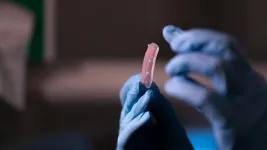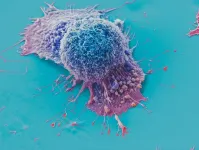(Press-News.org) Over the next 25 years, as the world shifts away from fossil fuels, the oil and gas wells that have sustained the fossil fuel age will have to be plugged.
No big deal, you might think, drilling those wells was the hard part. Plugging them should be no problem. But think again.
The Norwegian Continental Shelf, as an example, is punctured by more than 2000 wells. Harald Linga, centre director for SWIPA (see box), a Centre for Research Based Innovation based at SINTEF, Scandinavia’s largest independent research institute, estimates that plugging them using today’s technology will cost upwards of NOK 800 billion – that’s USD 73 billion.
And while oil companies are responsible for plugging the wells, Norwegian taxpayers will have to shoulder 78 per cent of these costs.
And that’s just Norway. The total number of oil wells across the globe could number in the millions, all of which at some time will have to be plugged.
A search for alternatives
Today’s technology involves using a cement plug that can be between 50-100 metres long. These plugs, it turns out, aren’t that great. They can develop leaks over the long run, for many different reasons, says Lewaa Hmadeh, a PhD candidate at the Norwegian University of Science and Technology (NTNU’s) Department of Geoscience and Petroleum who is also affiliated with SWIPA. One of the most troubling problems is that leaking abandoned petroleum wells can be a significant source of greenhouse gas emissions, he said.
“Every year, the Norwegian Oil and Gas Association sets a roadmap for new plugging and abandonment technologies needed to solve problems faced by the industry, and ever since 2015, finding an alternative to cement has always been there,” Hmadeh said.
But there’s hope in sight.
Hmadeh’s PhD research involves studying the use of bismuth as a substitute and/or additive for plugging wells. He’s one of many scientists across the globe trying to find a better solution for this challenge. And if his initial results are any indication, a mix of bismuth and tin could offer the petroleum industry a safer and cheaper solution to well plugging than cement.
The problem
First of all, it’s important to remember that plugging an oil well is an expense that is just that – by definition, it’s done at the end of the life of the well, so it is a cost for which there is no income.
“There’s no revenue,” Hmadeh said. “You are literally burying the money there in the ground.”
Cement has become the industry standard, in part because the substance itself is relatively cheap, and its properties are well known. But over time, the problems with a cement plug – which under Norwegian regulations, needs to be between 50-100 metres long – have come clear, Hmadeh said.
“They are highly vulnerable to corrosion,” and to CO2, or hydrogen sulphide, both of which are found in subsea well environments, he said. The plugs also have to withstand huge differences in pressure above the plug and below.
They can crack or lose their seal in the high pressure, high temperature environments that are typical of wells. And perhaps most importantly, cement also shrinks as it cures, which causes the formation of little pores.
“These can be paths for hydrocarbons to migrate to the surface,” Hmadeh said.
The industry has experimented with different alternatives, varying from adding substances to cement and testing other substances, including bismuth. That’s where Hmadeh’s work comes in.
Why bismuth?
Bismuth alloys are impermeable, which means there is no chance for there to be leaks through the plug, Hmadeh says.
And unlike cement, which shrinks as it solidifies, bismuth alloys expand as they solidify.
“They also maintain their integrity over the long term, because they are not affected by corrosion, or by CO2 or hydrogen sulphide. And they also have a reduced installation time due to the rapid hardening of the alloy,” Hmadeh said.
This last can be an important factor on the Norwegian Continental Shelf, where sea conditions can be challenging, and the less time needed to install the plug, the better, he said.
"Reduced installation time reduces the rig time, which in turn reduces costs," Hmadeh said. "One other aspect of bismuth alloy plugs is that they have the potential to be deployed riglessly, meaning that without the neccessity of having a rig in place. This will in turn cut on costs drastically, as most of the costs offshore come from the 'rig-rental' costs."
In the lab
Hmadeh’s laboratory experiments have compared the performance of bismuth alloys to cement plugs. In one study, he conducted a leak test in steel pipes, comparable to an oil well, with a 185 mm cement plug and a 121 mm bismuth- tin alloy plug.
When Hmadeh conducted hydraulic “push-out” tests and leakage tests with nitrogen gas, he found that bismuth alloy plugs had higher resistance to applied pressure and reduced gas migration compared to cement, which meant the bismuth alloy makes a better seal.
But Hmadeh cautions that it’s a long way from the lab bench to actual wellbores, so much more work is needed.
“Our team at NTNU is doing a great job making extensive knowledge about this new technology public and accessible for everyone,” he said. “It’s too early to draw conclusions. But this plug has great potential. We have to upscale it to see how it will behave at different lengths,” which will take some years.
What is SWIPA?
SFI SWIPA stands for Subsurface Well Integrity Plugging and Abandonment. It is a centre for research-based innovation (SFI) established under the auspices of the Research Council of Norway from 2020-2028.
SFI SWIPA aims to obtain a scientific understanding of permanent well barriers to allow for improved well barrier design methodologies. The centre’s director is Harald Linga of SINTEF. In addition to SINTEF, the centre's research partners are NTNU, NORCE, IFE, and University of Stavanger, while its financial industry partner are Aker BP, Equinor and Wintershall Dea.
Its primary goals are to:
Facilitate rapid deployment of well barrier establishment and plugging and abandonment (P&A) technologies and system solutions that reduce offshore P&A costs by 50%.
Increase value creation in the Norwegian oil and gas industry by the implementation of new P&A- and sidetrack solutions.
Create new solutions and products for well integrity issues for CO2 storage, nuclear waste storage and reconversion of petroleum wells.
END
Can bismuth prevent oil leaks – (and save Norwegians billions)?
2024-04-18
ELSE PRESS RELEASES FROM THIS DATE:
Atmospheric isotopes reveal 4.5 billion years of volcanism on Jupiter’s moon Io
2024-04-18
Sulfur and chlorine isotopes in the atmosphere of Jupiter’s moon Io indicate that it has been volcanically active for the entire 4.57 billion-year history of the Solar System, according to a new study. The findings offer new insights into the moon’s history. Io is the most volcanically active body in the Solar System. This extreme level of volcanic activity is the result of tidal heating from friction generated within the moon’s interior as it is pulled between Jupiter and its neighboring moons of Europa and Ganymede. However, how long Io has hosted such extensive ...
An ink for 3D-printing flexible devices without mechanical joints
2024-04-18
For engineers working on soft robotics or wearable devices, keeping things light is a constant challenge: heavier materials require more energy to move around, and – in the case of wearables or prostheses – cause discomfort. Elastomers are synthetic polymers that can be manufactured with a range of mechanical properties, from stiff to stretchy, making them a popular material for such applications. But manufacturing elastomers that can be shaped into complex 3D structures that go from rigid to rubbery has been unfeasible until now.
“Elastomers are usually cast so that their composition cannot be changed in all three dimensions over short length scales. To overcome ...
Association for Chemoreception Sciences (AChemS) 46th Annual Meeting
2024-04-18
Media Contact:
Dr. Alissa Nolden, Chair - Public Information & Affairs Committee, anolden@umass.edu
Bonita Springs, FL— The Association for Chemoreception Sciences (AChemS) stands as a premier organization dedicated to advancing the understanding of chemosensory systems. With a rich history spanning over four decades, AChemS has played a pivotal role in fostering interdisciplinary research and collaboration in the fields of taste, smell, and chemical senses. AChemS provides a platform for scientists, clinicians, and industry members from diverse backgrounds to exchange ideas, present cutting-edge research findings, and address pressing challenges ...
How the Birmingham Drug Discovery Hub created an investment-ready ‘drug library’
2024-04-18
A novel approach to drug discovery is enabling University of Birmingham researchers to overcome the ‘valley of death’, where projects fail due to the funding gap between original research and commercial investment.
The approach, detailed in a feature published in the April issue of Drug Discovery Today, has attracted more than £4m in industry funding, grants and industry awards, on the back of just £0.2m investment from the University’s Dynamic Investment Fund (DIF).
The Birmingham Drug Discovery Hub ...
Scientists uncover 95 regions of the genome linked to PTSD
2024-04-18
In posttraumatic stress disorder (PTSD), intrusive thoughts, changes in mood, and other symptoms after exposure to trauma can greatly impact a person’s quality of life. About 6 percent of people who experience trauma develop the disorder, but scientists don’t yet understand the neurobiology underlying PTSD.
Now, a new genetic study of more than 1.2 million people has pinpointed 95 loci, or locations in the genome, that are associated with risk of developing PTSD, including 80 that had not been previously identified. The study, from the PTSD working group within the Psychiatric Genomics Consortium (PGC - PTSD) together with Cohen ...
AI tool predicts responses to cancer therapy using information from each cell of the tumor
2024-04-18
With more than 200 types of cancer and every cancer individually unique, ongoing efforts to develop precision oncology treatments remain daunting. Most of the focus has been on developing genetic sequencing assays or analyses to identify mutations in cancer driver genes, then trying to match treatments that may work against those mutations.
But many, if not most, cancer patients do not benefit from these early targeted therapies. In a new study published on April 18, 2024, in the journal Nature Cancer, first author Sanju Sinha, Ph.D., assistant professor in the Cancer Molecular Therapeutics ...
CEOs’ human concern translates into higher stock price
2024-04-18
Compassionate leadership has tangible benefits: CEOs’ expressions of empathy correlate with positive stock performance, a study led by the University of Zurich shows. The researchers analyzed data from conference calls between CEOs and financial analysts during the COVID-19 pandemic.
The COVID-19 pandemic prompted an unprecedented financial crisis. Between 24 February 2020, and 20 March 2020, the value of U.S. companies on the stock market decreased significantly, surpassing the decline during the 2008-2009 financial crisis.
At the onset of the pandemic, several CEOs made statements ...
Smoking-related deaths could be reduced if people attending lung cancer screening are offered stop-smoking support
2024-04-18
A new study has found that by offering stop smoking support as part of the national lung cancer screening programme, there is potential to save lives, and dedicated funding must be considered by policy makers.
The results of the study, published in the European Respiratory Journal, showed that offering stop smoking support at the same time and in the same place as lung screening, resulted in a high uptake of support across a range of demographic characteristics.
This has the potential to reduce smoking-related illness and death in a high-risk ...
Quick decisions in soccer enhanced by brain’s ability to suppress actions
2024-04-18
To pass or not to pass, that is the question faced by soccer players the world over in every match. It might be unsurprising that higher skilled players exhibit better execution of actions than lower skilled ones, but now an Osaka Metropolitan University-led research team has evidence that the neural process to suppress actions also plays an important role.
Research Center for Urban Health and Sports Assistant Professor Takahiro Matsutake and colleagues conducted an experiment to see how three levels of soccer players perform when faced with the same tasks.
The ...
Recycling CFRP waste is a challenge, but we've found a way to make it work
2024-04-18
Carbon fiber reinforced plastics (CFRP) are lighter and stronger than metal and are used in a variety of industries, including aviation, aerospace, automotive, marine, and sporting goods. In recent years, it has also been applied to new industries such as air mobility, which has led to an increase in its use and a waste disposal problem. However, CFRP is not naturally degradable, and high-temperature incineration methods emit toxic substances and cause environmental pollution, so it is urgent to develop ...






